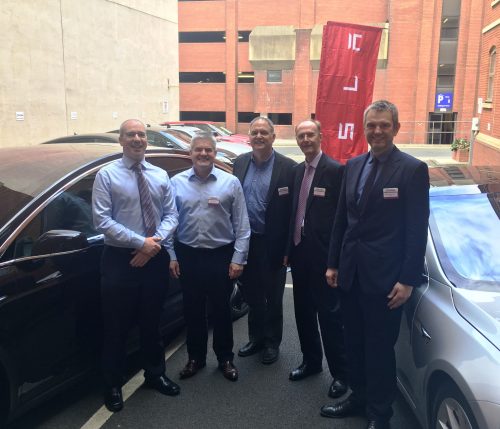YourNews: Innovative technology is giving logistics disruptors the edge

With today’s logistics sector dominated by sophisticated products and technologies from electric and driverless vehicles to high tech drones, Clarion’s latest seminar looked at how these logistics disruptors, many based in Yorkshire, are shaking up the supply chain and the widespread impact they are having not only on the transport industry, but across the myriad of sectors they support from manufacturing to retail.
Clarion’s business development director Steve Crow explains: “Logistics has seen ground-breaking changes in recent years as it has embraced technological advances in order to meet customers’ ever more exacting fulfilment requirements as well as becoming more cost, time and energy efficient. Increasingly, logistics businesses are working closely with customers to closely track the entire product journey in real time, wherever in the world it is made.
“In Yorkshire, we are fortunate to have some of the real innovators who are leading the way in driving change. The recurring theme in many of the ground-breaking initiatives being undertaken is the use of technology and capture of big data to optimise the process. These are exciting times and Yorkshire, as ever, is at the forefront of the latest innovations.”
Speakers included Tony Mannix, chief executive officer of Clipper Logistics plc, the UK’s leading retail logistics specialist, who looked at the way in which the supply chain is evolving in response to customers’ changing needs. Mr Mannix explained how the company had adapted to the huge changes in shopping habits since it was founded in 1992. Working with many of the leading names in fashion and general retail, not only does online activity now account for over 40% of Clipper Logistics’ business, but the management of returned products is also a massive part of its activities – via its Boomerang returns solution, the company expects to process circa fifty million returns in the coming year!
“Before the internet, returns were seen as low priority for most retailers, but online shopping has made everything immediate with customers expecting refunds to be processed on the day of return. The processes needed for us to swiftly deliver returned products back to the retailer ready for re-sale, are extremely complex and have required the development of bespoke IT systems to interface between us and the retailer. Given the complexities and sophistication of today’s logistics processes, retailers are increasingly sharing facilities and infrastructure.”
Mr Mannix continued: “We’re also seeing a huge growth in our click and collect services, via the Clicklink solution which has the added advantage of bringing customers into store to strengthen customer/brand loyalty, providing more selling opportunities for retailers. Customers now expect outstanding service and retailers realise that if their delivery or returns service fails to meet customers’ expectations, they will simply shop elsewhere.”
Other speakers at the seminar included Professor Richard Romano from the Institute of Transport Studies at Leeds University, who spoke about the latest developments in autonomous vehicles. Tim Padgett of PA Consulting discussed the ‘maturity model’ for autonomous vehicle implementation which is helping to inform the development of Department for Transport policy as well as covering the development work on Industry 4.0 (the current trend of automation and data exchange in manufacturing technologies). Finally, Matthew Hattersley, partner in Clarion’s commercial team looked at how logistics contracts need to change to accommodate new solutions and technology.
A number of Tesla models were on display – Tesla is the brand which has most shaken up the motor sector in recent years with its iconic range of high performance electric cars and the company is also playing a major role in the development of driverless cars. In addition, Julian Ford from Virtalis, the virtual reality software business, created a VR environment allowing attendees to engage with various ‘virtual’ transport models.
Picture shows (L to R): Tim Padgett of PA Consulting ; Tony Mannix, chief executive officer of Clipper Logistics plc; Professor Richard Romano from the Institute of Transport Studies at Leeds University ; Clarion’s business development director Steve Crow; and Matthew Hattersley, partner in Clarion’s commercial team








